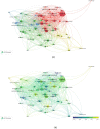Scoping review and bibliometric analysis of Big Data applications for Medication adherence: an explorative methodological study to enhance consistency in literature
- PMID: 32709237
- PMCID: PMC7379348
- DOI: 10.1186/s12913-020-05544-4
Scoping review and bibliometric analysis of Big Data applications for Medication adherence: an explorative methodological study to enhance consistency in literature
Abstract
Background: Medication adherence has been studied in different settings, with different approaches, and applying different methodologies. Nevertheless, our knowledge and efficacy are quite limited in terms of measuring and evaluating all the variables and components that affect the management of medication adherence regimes as a complex phenomenon. The study aim is mapping the state-of-the-art of medication adherence measurement and assessment methods applied in chronic conditions. Specifically, we are interested in what methods and assessment procedures are currently used to tackle medication adherence. We explore whether Big Data techniques are adopted to improve decision-making procedures regarding patients' adherence, and the possible role of digital technologies in supporting interventions for improving patient adherence and avoiding waste or harm.
Methods: A scoping literature review and bibliometric analysis were used. Arksey and O'Malley's framework was adopted to scope the review process, and a bibliometric analysis was applied to observe the evolution of the scientific literature and identify specific characteristics of the related knowledge domain.
Results: A total of 533 articles were retrieved from the Scopus academic database and selected for the bibliometric analysis. Sixty-one studies were identified and included in the final analysis. The Morisky medication adherence scale (36%) was the most frequently adopted baseline measurement tool, and cardiovascular/hypertension disease, the most investigated illness (38%). Heterogeneous findings emerged from the types of study design and the statistical methodologies used to assess and compare the results.
Conclusions: Our findings reveal a lack of Big Data applications currently deployed to address or measure medication adherence in chronic conditions. Our study proposes a general framework to select the methods, measurements and the corpus of variables in which the treatment regime can be analyzed.
Keywords: Bibliometric analysis; Big data; Medication adherence; Scoping review.
Conflict of interest statement
The author Valentina Lorenzoni is an Associate editor of the BMC Health Services Research. The rest of the authors have no competing interests.
Figures





Similar articles
-
Bibliometric analysis of global publications in medication adherence (1900-2017).Int J Pharm Pract. 2019 Apr;27(2):112-120. doi: 10.1111/ijpp.12471. Epub 2018 Jul 25. Int J Pharm Pract. 2019. PMID: 30044514
-
Application of e-Health tools in the assessment of inhalation therapy adherence in patients with chronic obstructive pulmonary disease: Scoping review coupled with bibliometric analysis.Respir Med. 2025 Jan;236:107898. doi: 10.1016/j.rmed.2024.107898. Epub 2024 Dec 9. Respir Med. 2025. PMID: 39638011
-
Improving medication adherence in hypertensive patients: A scoping review.Prev Med. 2021 May;146:106467. doi: 10.1016/j.ypmed.2021.106467. Epub 2021 Feb 24. Prev Med. 2021. PMID: 33636195
-
The effect of visual interventions on illness beliefs and medication adherence for chronic conditions: A scoping review of the literature and mapping to behaviour change techniques (BCTs).Res Social Adm Pharm. 2022 Aug;18(8):3239-3262. doi: 10.1016/j.sapharm.2021.11.006. Epub 2021 Nov 17. Res Social Adm Pharm. 2022. PMID: 34815181
-
The Use of Gamification and Incentives in Mobile Health Apps to Improve Medication Adherence: Scoping Review.JMIR Mhealth Uhealth. 2022 Feb 21;10(2):e30671. doi: 10.2196/30671. JMIR Mhealth Uhealth. 2022. PMID: 35188475 Free PMC article.
Cited by
-
Mobile-Health based physical activities co-production policies towards cardiovascular diseases prevention: findings from a mixed-method systematic review.BMC Health Serv Res. 2022 Mar 1;22(1):277. doi: 10.1186/s12913-022-07637-8. BMC Health Serv Res. 2022. PMID: 35232456 Free PMC article.
-
Emerging Trends and Hot Spots of Electrical Impedance Tomography Applications in Clinical Lung Monitoring.Front Med (Lausanne). 2022 Jan 31;8:813640. doi: 10.3389/fmed.2021.813640. eCollection 2021. Front Med (Lausanne). 2022. PMID: 35174185 Free PMC article.
-
Emerging trends and hot spots on electrical impedance tomography extrapulmonary applications.Heliyon. 2022 Dec 21;8(12):e12458. doi: 10.1016/j.heliyon.2022.e12458. eCollection 2022 Dec. Heliyon. 2022. PMID: 36619470 Free PMC article.
-
Integration of artificial intelligence in orthodontic imaging: A bibliometric analysis of research trends and applications.Imaging Sci Dent. 2025 Jun;55(2):151-164. doi: 10.5624/isd.20240237. Epub 2025 Apr 10. Imaging Sci Dent. 2025. PMID: 40607069 Free PMC article. Review.
References
-
- Sabte E. Adherence to long-TermTherapies: evidence for action: World Health Organization; 2003. 10.1016/S1474-5151(03)00091-4. https://apps.who.int/iris/handle/10665/42682. - PubMed
Publication types
MeSH terms
LinkOut - more resources
Full Text Sources

